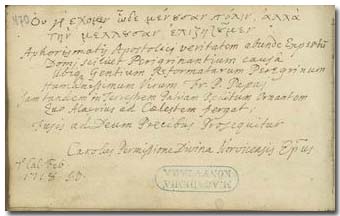

Aphorismatis Apostolici veritatem abunde Expertum Domi scilicet
Perigrinantium causâ Ubique Gentium Reformatarum Peregrinum
Humanissimum Virum Fr[anciscum] P[ariz] Papai Jam tandem in
Terrestrem Patriam Reditum Ornantem Quo Alacrius ad Caelestem
pergat; Hujus ad Deum Precibus Prosequitur
Carolus Permissione Divina Norvicensis Ep[iscop]us
7º Cal. Feb. 1718. s[tilo] v[eteri].
|
* Heb 13:14: Vulgate: “non enim habemus hic
manentem civitatem sed futuram inquirimus”. Also quoted by
Johann Rudolf Wettstein on p. 305.
|
|
|
|
For here have we no continuing city, but we seek one to come. *
In order the most outstanding of the
many Reformed peregrinating everywhere, Ferenc Pápai Páriz, who
had abundantly experienced the truth of this apostolic saying,
could safely return now to his fatherland on the earth, and at the
end [of his life] to our common celestial fatherland, let him be
accompanied by my prayers.
Charles, by divine permission Bishop of
Norwich
[Norwich,] on the seventh day
before the calends of February, 1718, by the old calendar.
|
p.
470. Norwich, February 6, 1719
Trimnell, Charles
(1663-1723), English pastor and
bishop
Charles Trimnell was baptized on May 1, 1663 in Abbots Ripton
(former Huntingdon county); his father was the pastor Charles T. (1630-1702).
From 1674 he studied in Winchester College of Winchester, and in
1681 he immatriculated in New College in Oxford. Here he
graduated M.A. in 1688, and in 1699 doctor of theology (D.D.). In
1688 he was appointed chaplain of the Rolls chapel. In 1689 he
accompanied the Earl of Sutherland and his wife to their travel in
the Netherlands, then he became their chaplain in Althorp
(Northamptonshire). In 1691 he received a prebend in Norwich, then
a pastor's office. In 1698 he was nominated archdeacon of Norfolk.
At the synod of 1701-1702, as well as in his pamphlets, he argued
for the rights of the crown. In 1701 he was appointed chaplain in
ordinary of Queen Anne. After various ecclesiastical offices in
1707/08 he was consecrated Bishop of Norwich. In this office he
also proclaimed that, according to Anglican traditions, the church
has to be subordinate to the state. His oration delivered in March
1710 in the House of Lords was also published. At the accession to
the throne of George I he became a member of the royal cabinet,
and he remained it until his death. From 1721 he was Bishop of
Winchester. He died on August 15, 1723 in Farnham Castle (Surrey).
He married twice, but his two sons died at an early age. He had
the reputation of an ardent debater, and insulted many. He also
disputed fundamental teachings of the church like offering or
absolution. He was also accused of scepticism. His views
undoubtfully contributed to his career, but he sincerely professed
both his ecclesiastical and secular principles. He published
several sermons and parliament orations, like: An account of the proceedings between the two houses
of Convocation which met October the 20th 1702: particularly of the
several proposals made for putting an end to the present
differences … London, 1704. – The Bishop of Lincoln’s
[William Wake] and Bishop of Norwich’s [Charles Trimnell]
speeches in the House of Lords, March the 17th at the opening
of the second article of the impeachment against Dr. Sacheverell.
London, 1710.
•
DNB • Michaud |

